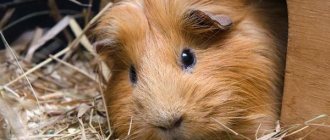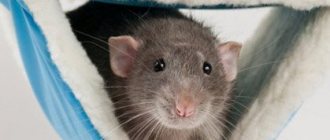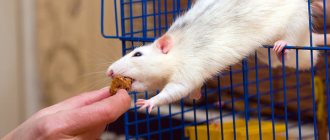About vaccination
Any owner who raises rabbits commercially or keeps ornamental animals as pets should understand that all types of rabbits require vaccination. These animals are susceptible to various diseases, including diseases that pose a threat to humans. Of course, it is wiser to prevent diseases than to treat them later, especially since some of them cannot be treated at all.
There are a number of vital vaccinations for rabbits.
Vaccines are designed to produce immunity in an animal against a specific pathogen. Sometimes rabbits may develop symptoms after vaccination, but the illness is mild and the risk of contracting the same infection in the future is minimal.
Microbes of various infections are transmitted to rabbits through contact with each other and other animals, through insect bites, while walking, eating food and drinking water. Therefore, even those pets who spend their entire lives in an apartment with caring owners are not immune from diseases.
Rabbits during pregnancy can also be vaccinated with any vaccine at different times (inactivated polyvalent drugs work better), but it is better to immunize them in advance. The only contraindication is the lactation period, since vaccination of the female can negatively affect the health of the newborn young. For breeding rabbits, the necessary vaccinations must be completed several weeks before mating. This ensures the animals' immunity to dangerous diseases and protects future rabbits.
Do rabbits need to be vaccinated at all?
Many bacteria, viruses, and fungi are dangerous for animals. They are everywhere, especially when mistakes are made in the content. A strong body can cope with most of them, but rabbits have naturally weak immunity.
Some farmers do not vaccinate their animals, considering vaccination to be an unnecessary hassle and expense. Not everyone is familiar with the rules for preventing infectious diseases. In this case, rabbits become very vulnerable to any infections.
Animals become infected in different ways:
- Alimentary - through the digestive organs. For example, they ate the wrong grass and became infected through the drinking bowl.
- Airborne - from sick brothers.
- Transplacental . The mother passes germs to her babies while still in the womb. Sometimes the female rabbit is infected by the male breeder. Some animals are hidden virus carriers.
- Contact . The disease is not necessarily transmitted by relatives. Carriers can be mice, rats and other animals living in the neighborhood.
There are special risk groups among rabbits:
- juveniles;
- females during pregnancy or lactation;
- animals weakened by trauma and conditions of detention.
Some diseases have practically no cure. Mortality reaches 80–100%. Vaccinations for rabbits are the only means of combating many diseases.
Mass deaths are not uncommon. You can perfectly master all the intricacies of rabbit breeding, but because of refusal of vaccines, you can lose your business overnight.
Is it always possible to avoid illness?
Vaccination does not always save rabbits from infection. There are often cases when already vaccinated individuals are affected by the disease. There may even be a mass death of vaccinated animals during periods of epidemic, which is why many breeders refuse routine vaccinations.
The reason for the death of animals may be either a low-quality vaccine for vaccination or the wrong approach of the owner himself. Most often, rabbits die from infection for the following reasons:
- purchase of an uncertified drug;
- improper storage of the vaccine;
- vaccination of a sick animal;
- non-sterile instruments;
- incorrect dosage of the drug;
- carrying out revaccination in violation of the deadlines.
The cause of death of the animal may not be related to the administration of the drug. Therefore, before canceling vaccination, the cause of the pet’s death should be established. To choose a high-quality vaccine, it is better to consult a veterinarian or experienced breeders.
At what age are vaccinations recommended for rabbits?
All breeds need vaccinations. It’s not for nothing that rabbits are at risk - their immunity is weaker, they are prone to stress, which further undermines the body’s defenses. Usually the first vaccination is given to a baby rabbit at 1.5 months.
First, the animals receive protective substances (antibodies) from their mother's milk. The cubs are weaned from the mother rabbit at the age of 3 weeks. Immunity obtained with milk lasts for another 30–33 days.
Next you will need a vaccine for rabbits. With the help of vaccinations, immunization is carried out - the artificial creation of protection.
Sometimes it is necessary to vaccinate animals earlier - at 30 days. This is due to the risk of infection and epidemics. In the future, revaccination is carried out - the same vaccinations are given every 6 months. There are other deadlines.
If the baby rabbit is suitable in age, but is not ready in terms of weight or health, the procedure is postponed.
Causes
Rabbits receive colostral immunity through colostrum. Taking into account the constant increase in live weight, the antibody titer is constantly falling and by the age of four weeks it is no longer able to restrain the attack of infectious agents. Some rabbit breeders mistakenly believe that antibodies come from milk to the baby. However, it is not. The body has only those anti-bodies that came with colostrum.
Therefore, in regions where there is a threat of infection with viral hemorrhagic disease (VHD), as well as myxomatosis, vaccination is practiced at 4 weeks. The first infection is transmitted by humans, the second is spread by mosquitoes. The baby rabbit’s immune system is not able to produce enough antibodies for long-term protection, so the vaccination is duplicated for four-month-old rodents.
Decorative rabbit
Mandatory vaccinations
First of all, rabbits will need vaccines against myxomatosis and VGBV - especially dangerous and common diseases. These vaccinations are considered mandatory.
For myxomatosis
One of the most dangerous viruses was obtained artificially. About a hundred years ago there were too many wild rabbits in France. To exterminate the excess ones, the myxomatosis virus was invented. The situation quickly got out of control. The virus mutated and began to infect domestic animals.
The microbe is transmitted by airborne droplets through mosquito bites. Signs of the disease include fever, swelling and tumor nodes, conjunctivitis (purulent), weakness. The animal dies two days after infection.
The disease is almost untreatable: mortality is 70–100%. The only effective way of control is prevention and vaccination of rabbits.
Cubs are vaccinated as quickly as possible - at the age of 1 month. It is better to do this in spring or early summer. Vaccination of rabbits against myxomatosis is repeated after 3 months, then every six months in spring and autumn.
From VGBK
Another mandatory vaccination is given against viral hemorrhagic disease of rabbits. It is called VGBK for short. It is transmitted through contaminated feces of sick animals and dirty bedding. Carriers can be mice, birds, and insects.
The first signs appear three days after infection. Symptoms: convulsions, loss of appetite, high fever, moaning, weakness, nasal discharge. VGB leads to hemorrhages, damage to the lungs and liver. After a few days the animals die. Vaccinations for rabbits are the only way to protect them.
Vaccination is carried out as standard at 1.5 months. After 90 days they do it again. Then - every six months.
Vaccinations for rabbits
Females are usually vaccinated at any stage of pregnancy. After childbirth and during breastfeeding, vaccinations are not given so as not to harm the offspring . During pregnancy, it is better for female rabbits to be given special serums and complex-action preparations. They help the immune system more effectively.
Pregnant females are vaccinated, but the condition is closely monitored. In addition to possible harm to the fetus, the procedure is stressful, so it is better to vaccinate before pregnancy. It is advisable to vaccinate rabbits at least 2 weeks before mating.
Can this be done for pregnant rabbits?
Regardless of the period of pregnancy, females are allowed to be vaccinated.
The only exception is during lactation - the antibodies contained in the drug have a negative effect on the body of rabbits.
It is recommended that pregnant females receive complex vaccines, but only under the supervision of a doctor.
Once the procedure is complete, you will have to carefully monitor any changes in their behavior. If alarming symptoms occur, you should immediately consult a specialist.
Optional vaccines
Other diseases are less dangerous or occur less frequently. There are also vaccines to combat them. At home, such vaccinations for rabbits are given as needed. As a rule, this issue is resolved by a veterinarian.
For rabies
Rabies is comparable in danger to myxomatosis and VGBV. Vaccinations are not mandatory because the virus is very rare in rabbits. Animals usually become infected after being bitten by a sick animal. The main symptoms of rabies include:
- unnatural behavior;
- copious amounts of saliva;
- refusal of water.
The infected animal dies within a week. Vaccination of decorative rabbits that travel with their owners on planes and trains is mandatory. The rest are rarely vaccinated.
The first time is vaccinated at the age of approximately 2 months. The rabbit must be vaccinated at least 30 days before the flight or other travel. The vaccination is repeated annually.
For listeriosis
The disease is caused by bacteria (bacillus) that are spread by blood. Sources of infection:
- the main danger is contaminated food;
- blood - in case of damage, contact with mucous membranes;
- tick bites;
- from the mother through the placenta.
The disease affects most domestic animals, including pigs, goats, cats, and dogs. Listeriosis is also dangerous for humans.
Strong rabbits sometimes fight off infection without showing symptoms. In some cases, the signs go away, but the animals become hidden carriers of bacteria. After symptoms disappear, they are contagious for another 30–40 days.
The disease is especially dangerous for pregnant, lactating, young, old and weakened animals. Listeriosis often progresses quickly in rabbits. The animal and fetus die within a few hours.
Symptoms depend on the form of the disorder and the health of the animal. Common ones include:
- lethargy;
- loss of appetite;
- leg cramps, sometimes paralysis;
- throwing back the head;
- discharge with blood from the genitals.
Farm animals are rarely treated for listeriosis. As a rule, decorative rabbits are vaccinated. The body's protection is activated 3–5 days after the injection. Immunity lasts for at least 5 months.
From pasteurellosis and salmonellosis
With pasteurellosis, bacteria affect the mucous membranes of the trachea, throat, and nose. The acute form usually leads to death within a few days. Hidden carriers sometimes have no symptoms.
Rabbits are vaccinated at 1.5–2 months. Immunity appears after two weeks. Protection lasts about three months.
Salmonellosis affects the digestive organs and reproductive system. The most common route of infection is nutritional. In the acute form, the animal often dies after 18–25 days.
Complex vaccines are often given. They protect not only from salmonellosis, but also, for example, from colibacillosis.
Possible complications.
Animals usually tolerate vaccination well, without complications, and the stress caused by the injection usually completely disappears after 2-3 hours. However, in some cases, a rabbit may be allergic to the vaccine and show symptoms 15-20 minutes after vaccination.
The main symptoms of an allergic reaction include:
- redness of the mucous membranes;
- rash; excessive salivation;
- drowsiness;
- dyspnea;
- loss of consciousness.
If after vaccination one or more of the above signs are observed, the animal is immediately injected intramuscularly with 0.3 ml of the antihistamine Suprastin or Diphenhydramine. To maintain cardiac function, 0.3 ml of sulfocammofocaine and 20 ml of saline are administered subcutaneously.
Rabbit vaccination scheme
Each farmer decides which diseases to vaccinate against, selects medications, determines a plan and timing. It is better to coordinate the work with a veterinarian.
The vaccination schedule is different in each case. It includes mandatory vaccinations. The rest is up to you.
There are mono-vaccines and complex (associated) ones. The former help against one infection, the latter - against several. When single vaccines are used, the interval between injections is 2 weeks.
For convenience, some compile tables with a planned schedule of procedures.
The regimen sometimes includes optional vaccinations, for example, against listeriosis. Plus, you can take an associated vaccine for rabbits. It helps against several diseases. Often, mandatory remedies are combined in one bottle: for myxomatosis and VGB.
What else threatens eared pets?
In addition to the diseases described above, decorative rabbits can suffer from other ailments: pasteurellosis, salmonellosis or paratyphoid fever, listeriosis. It is best for male rabbits to be vaccinated against the first two viruses within the first 24 hours after acquisition. The only thing that needs to be taken into account is the time gaps between the introduction of different pathogens. The interval should be at least 2 weeks. In this case, a very good option, as with vaccination against the viruses described above, is a complex vaccine.
For beginners in the field of keeping domestic dwarf rabbits, it is best to consult with experts in the field of breeding these animals about whether to give their pets additional vaccinations, what diseases to vaccinate against, and how to do it correctly.
Modern veterinary drugs carry a minimal risk of complications and side effects. In addition, every owner should know that vaccinating a rabbit costs significantly less than treating a pet for a complex disease or, worse, losing a long-eared pet. So choosing the current vaccine is the most accessible and effective method of preventing diseases in rabbits.
Preparing for vaccination
To ensure everything goes well, do the following before vaccination:
- Worms are removed 1–2 weeks before vaccination . When deworming was carried out according to plan, nothing more is given. Within three months after the fight against worms, the animal can be vaccinated.
- Control your weight. At the age of 1.5 months, the weight should be at least 500 g.
- Assess your well-being. They check discharge from the nose, eyes, appearance of stool, urine, and fur. Sick and weakened individuals are not vaccinated, but wait until they improve.
- Preparations are prepared, for example, complex vaccines for rabbits. Sometimes more solvents are needed. It is advisable to take anti-allergy medications.
The body temperature of rabbits should be from +38.5 to +39.5 °C. Monitor the day before vaccination and before the procedure.
Although on large farms, temperatures are usually not checked. This indicator is more often used for decorative and dwarf pets.
How to vaccinate rabbits
When breeding animals, it is advisable to find a good veterinarian and rely on his advice. Many farmers turn to specialists to carry out preventive procedures. If this is not possible, they do it on their own. Vaccinating rabbits at home, even for beginners, is not something impossible.
This is a responsible job and it is done strictly according to the rules:
- The drugs are purchased from a reliable seller. Check the expiration date and storage conditions.
- Properly stored and transported after purchase. Suitable temperature is from +2 to +8 °C. Don't freeze.
- Read the instructions for use for the vaccine. As a rule, the most important things are there: dosage, timing and methods of administration.
- Dry (powder) vaccines are diluted according to instructions. Use special solvents or distilled water. Do not forget about expiration dates after opening. After preparing the solution, there are several hours left to give the injection.
- Different drugs are not mixed in a syringe, even if they are from the same manufacturer.
- It is recommended to vaccinate on a cool day. At air temperatures above +28 °C, rabbits feel worse and take longer to recover from the procedure.
- The vaccine is injected according to the instructions: intramuscularly, subcutaneously.
- It is advisable to use insulin syringes, “machine guns” or special injectors.
- Be sure to secure the hind legs, especially in large animals.
- Release the air from the syringe.
- The needle is inserted at the desired angle so as not to touch a nerve or blood vessel.
It is better for a beginner to work with an assistant who will hold the animal, as rabbits will break out.
Where to do it and who can help
If the owner of the animal has already decided to vote in favor of vaccination of decorative rabbits, the best place for manipulation will certainly be a specialized veterinary clinic (Moscow), where the procedure will be carried out quickly, professionally and will be able to comply with all precautions after vaccination. Serious measures include disposal of ampoules and syringes after the procedure. Few people know that they cannot simply be thrown into the trash, otherwise this will lead to a massive spread of infection. They must be exposed to high temperatures before discarding. If vaccination was carried out independently, these items must be boiled for 15 minutes.
Not all localities can boast of an abundance of medical facilities for animals and the presence of qualified specialists in the treatment of decorative rabbits. In this case, you will have to carry out the injections yourself. Vaccinations for domestic rabbits are given intramuscularly in the hind leg or under the skin in the withers area.
Effectiveness of vaccination
Vaccinations are an effective way to fight diseases. However, they do not always help. Complex vaccinations for rabbits and monovaccines do not protect in the following cases:
- Late holding . Any vaccine needs time for the body to learn to produce antibodies (immunity). If infection has already occurred, there is no point in vaccinating a sick individual. It is still advisable to vaccinate healthy animals.
- Errors during preparation or during the procedure. For example, effectiveness decreases when more than a few hours have passed after the vaccine is diluted. Sometimes the drug is stored incorrectly, the expiration date has expired, or there are other irregularities.
- No vaccination is 100% guaranteed . It is important to constantly maintain the immunity of animals. It is influenced by conditions of detention, dietary habits, etc.
Why is it better to entrust it to a specialist?
- A veterinarian will be able to conduct a qualified examination of the animal to determine its health status, and, if necessary, prescribe additional examinations and tests.
- The specialist is responsible for the quality and expiration dates of the drugs he uses (if in doubt, you can check this, but it is better to seek help from doctors who do not raise doubts).
- An allergic reaction can occur even if the vaccine is administered by a professional. Why then contact him? Because it is a specialist who can promptly identify the first signs of its manifestation and provide qualified assistance, preventing the development of negative consequences and the possible death of the animal.
- The doctor, due to the nature of his activity, knows better the epizootic situation in the region and can suggest which vaccines are best to use.
This is especially true for owners of domestic decorative rabbits and beginner rabbit breeders.











